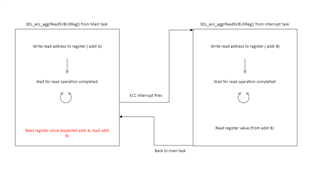Tool/software:
We are trying to inject 1bit error to all the memory regions of BLAZAR_IIRAM_ECC and BLAZAR_IDRAM_ECC. But during the reading of ECC Ram control registers, SDL_ecc_aggrIsSVBUSRegReadDone is getting stuck randomly. You can verify the same from the below call stack.

As per the "TRM_spruim2h.pdf", this the right procedure to read the ECC control and status register.

But there is no timeout for this function, which leads our program to stuck in a never ending loop.

Do you have any suggestion on what could lead to such scenario?


